What's Happening?
Elon Musk has revealed new details about Tesla's AI5 chip, the next-generation hardware for self-driving technology. The AI5 chip, previously known as Hardware 5, is set to be manufactured by Samsung and
TSMC at their facilities in Arizona and Texas. This chip is designed to significantly enhance Tesla's self-driving capabilities, offering 40 times the speed, 8 times the compute power, and 9 times the memory capacity compared to its predecessor, AI4. The AI5 chip will be integrated into Tesla's vehicles and Optimus humanoid robots, focusing on real-time inference for safe and logical decision-making. Musk highlighted the chip's design as a major leap forward, with production samples expected next year and high-volume production slated for 2027.
Why It's Important?
The development of the AI5 chip is crucial for Tesla's ambitions in autonomous driving and AI technology. By significantly improving the performance and efficiency of its self-driving systems, Tesla aims to maintain its competitive edge in the rapidly evolving automotive industry. The collaboration with major manufacturers like Samsung and TSMC underscores the importance of reliable and scalable production capabilities. This advancement could accelerate the adoption of self-driving vehicles, potentially transforming transportation and mobility. Stakeholders, including investors and consumers, stand to benefit from enhanced safety features and innovative applications in Tesla's product lineup.
What's Next?
Tesla plans to release samples of the AI5 chip next year, with limited integration into vehicles. Full-scale production is anticipated by 2027, aligning with Tesla's timeline for new vehicle models like the Cybercab. The company is also looking ahead to future iterations, such as AI6 and AI7, which promise further performance enhancements. As Tesla continues to innovate, the automotive industry may see increased pressure to advance self-driving technologies, prompting potential regulatory discussions and competitive responses from other manufacturers.
Beyond the Headlines
The AI5 chip's development raises questions about the ethical and legal implications of autonomous driving technology. As Tesla pushes the boundaries of AI, concerns about data privacy, safety standards, and the impact on employment in traditional driving roles may emerge. Additionally, the collaboration with international manufacturers highlights the global nature of technological advancements and the need for cross-border cooperation in innovation.











